
Vol. 1, No. 12 Published by India China Division, Air Transport Command April 5, 1945
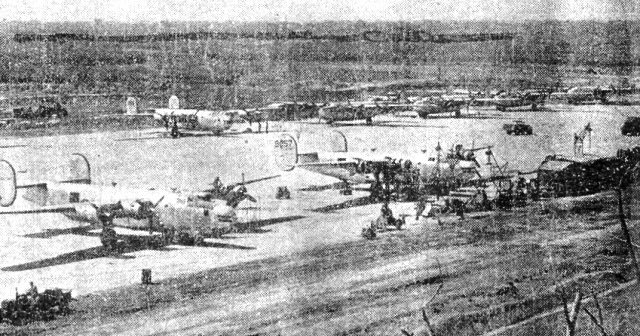 Henry Ford's bomber production line doesn't have much on this maintenance line at 1347 BU where C-109 fuel haulers
get a speedy going-over. In the background five planes pass through the Production Line Maintenance (PLM) stages,
while the two craft in the foreground have been diverted to another station for engine changes. Eventually hangars
will house operations, but work now goes on under the sky.
Henry Ford's bomber production line doesn't have much on this maintenance line at 1347 BU where C-109 fuel haulers
get a speedy going-over. In the background five planes pass through the Production Line Maintenance (PLM) stages,
while the two craft in the foreground have been diverted to another station for engine changes. Eventually hangars
will house operations, but work now goes on under the sky.
|
Air Evacuation
Is Streamlined
To Aid Patients
Stop-over Time Is Reduced
To 45 Minutes At 1311
1311 BU, Gaya, India - Streamlining of air evacuation for wounded and battle-weary GIs has cut the stopover time for hospital ships landing at this base to only 45 minutes.
Working side-by-side to achieve this result are the medics, chaplain, MPs, mess sergeants, refueling crews, alert crews, vehicle operators, operations clerks and priorities and traffic personnel.
When the door of an ATC hospital ship swings open, the medical officer starts up the steps and into the ship. He checks with the nurse and the medical technician and soon the ambulatory patients are walking down the steps to be welcomed by the chaplain and directed to a bus for the short ride to the line mess.
Plenty Food
Litter patients are lifted out of the ship by medical technicians and MPs, under the direction of the
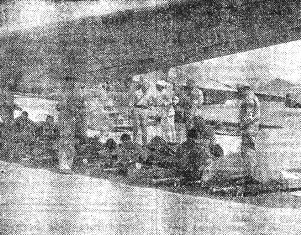 Shaded by the wings of a C-47, litter patients are pleased with all the attention they get. A medic with a pot
of iced tea, an MP with a jar of raspberry jam, an Indian bearer with hot food and plenty of seconds - all this leads
a patient to say, "Next thing you'll have a juke box."
Shaded by the wings of a C-47, litter patients are pleased with all the attention they get. A medic with a pot
of iced tea, an MP with a jar of raspberry jam, an Indian bearer with hot food and plenty of seconds - all this leads
a patient to say, "Next thing you'll have a juke box."
|
"It's the best food I've tasted in months," one man says. There are plenty of seconds for everybody.
Meanwhile, the alert crew and the refueling unit operators are working to prepare the ship for flight. Operations is giving the pilot and co-pilot the necessary clearance.
Two At A Time
"The pilots are ready. When can they take off?" Operations queries P & T. The medical officer tells P & T: "Litter patients are just starting their dessert. We are serving more iced tea. Give us 12 minutes."
The ship has been refueled. Litters are lifted back into the ship and strapped into position. Patients and crew are aboard. A few minutes later the ship takes off on the next leg of the journey to the U.S.
Sometimes a second hospital ship lands while the first is on the ground. The procedure is the same except that the MPs may have to stop a shuttle bus and clear it of passengers to afford adequate transportation.
One day in January, one hour before a hospital ship was scheduled to arrive, there was a minor accident on the only runway available for use. An alternate field 15 miles away was selected for the landing. When the ship came in, there was flawless co-ordination. Patients were fed and the ship was cleared for flight in less than one hour.
Tricks of PLM Trade Are Practiced in 1347th Setup
1347 BU, Shamshernagar, India - There are plenty tricks to the production line maintenance trade, and most of them are used here on the line which sends C-109 tankers into the air in tip-top condition.
Utilization of psychology in dealing with Indian laborers who save the base many military man-hours has paid dividends. yellow armbands are the workers' badge of distinction. Those who wear them are proud to be part of the "American airline business" and exult in the belief they are above the rank and file of laborers. They work hard to retain the right to wear their "badges."
The civilians are used for such jobs as decowling and recowling and they are being given a trial in cleaning and "pickling" spark plugs and acting as liaison runners between stations and crewmen.
One babu has a goldplated title - "Chief Grease Inspector." His job is to point out grease stains on the cowling and fuselage, for his section gang to remove. The title gives him zip in his job.
Another wrinkle in PLM here is a five-man "booster crew," a highly flexible unit quick to smell trouble. The men take tricky jobs and follow them through successive stages to completion. PLM here has earned the name, "Free-flowing maintenance," because of its flexibility which enables crews to handle special problems without interrupting the steady flow of aircraft along the line.
Maj. Lowell C. Brown, director of aircraft maintenance, had experience with Stateside PLM, helping set up the first system at Liberal, Kans. His work is closely co-ordinated with that of Lt. Alfred Kassin, PLM officer in charge, and Lt. Joseph M. Shanahan, AM supervisor. M/Sgt. Clifford Toepfer, NCOIC, has two flight chiefs on each of the two shifts to co-ordinate all specialized work.
Create Revenue Traffic Plan at P&T Parley
Improvements in Service Also Highlight Meeting
1350 BU, Kunming, China - Methods of handling revenue traffic and a drive to improve quality service highlighted the two-day conference of China base priorities and traffic directors here.
Plans for charging, by means of cash and lend-lease credit, were set up for standardized execution throughout the China wing. From now on, ICD plays a dual role, hauling U.S. war material and military personnel, and extra-military, Allied government cargo and personnel on a pay basis.
Quality Service
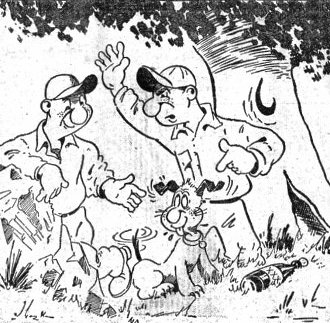 "Bloodhound, hell boozehound."
"Bloodhound, hell boozehound."
|
According to Maj. D. A. MacGregor, division revenue traffic officer, a large percentage of supply, hitherto carried on a "free" basis for Allied nations, now will be carried on a lend-lease arrangement. The authority as to charging for personnel and materiel will come from China theater headquarters insofar as intra-China haul is concerned.
Quality service was an important feature on the meeting agenda. This pertains not only to the handling and treatment of passengers, GI as well as officers, but also to the contacting and servicing of shippers and consignees.
Plans were discussed for the procurement and operation of GI vehicles utilized in the loading and unloading of Hump and China-based aircraft.
Department Co-operation
Methods of improved and safer loading and tie-down were explained. Various sections of base level staff activities were discussed and their functions were outlined. Co-operation between operations, P & T, area control, air traffic control, S & S and maintenance were stressed.
Officers attending the two-day session were Capt. C. J. Loupassakis, 1339; Maj. L. D. Schwartz, 1340; Lt. C. C. Stewart, 1341; Capt. G. M. Boedeker, 1342; Capt. N. P. Green, 1343; Capt. S. B. Joseph, 1344; Capt. J. H. Brust, 1338, and 1st Lt. H. E. Pentier, CO, ATC detachment.
Railway from Bazar To Base Solves a Travel Problem
1327 BU, Tezpur, Assam, India - Getting Indian laborers to and from this base has been solved once and for all with the opening of a railway line connecting the post and the local bazar.
When trucks became difficult to obtain, supply and service arranged to use a nearby rail spur. British authorities provided an early model Indian locomotive plus five so-called coaches.
Now the train leaves the nearby community each morning packed with more than 300 Indians and arrives about an hour later. Then the coaches are sidetracked until 5:30 p.m. when the locomotive returns to take the now-jubilant workers back to the metropolis.
With the opening of the new line, Atul C. Das, civilian personnel supervisor, got a new job. Like a weights and balance man, he has to allocate the load properly. The old coaches are so constructed that they can become top heavy and might tip over.
The new rail service saves four trucks two round trips daily, traveling a total of 120 miles over rough and unsurfaced roads. These trucks can now be used for hauling freight.
Maj. Gug R. Plumb, base engineer, had the idea and after several early arrangements fell through, S & S submitted a letter to SOS requesting the needed rail transportation.
Ideas for Boosting Morale at 1340 BU Cinch Bond for GI
1340 BU, Kunming, China - Three suggestions for boosting morale here - including establishment of a furlough policy calling for eligibility every six months and choice of rest camps - won a $25 war bond for Sgt. Eugene Tarakjian.
Among Tarakjian's others, which helped cop the prize, was initiation of shuttle bus service between billets and working area and periodic interviews of all enlisted men to afford them an opportunity to air complaints and other recommendations for improvements.
Suggestions which flowed into the chaplain's office included: A 45-day Stateside furlough every year; more beer; an NCO club; a copy of Hump Express for every man in ICD; strict adherence to the point system after Germany's defeat; first class travel for GIs while traveling to and from the States; establishment of definite saluting areas in China.
Two Crews Bail Out on Flights From Assam Bases,
Meet in China After Trip Over Mountain
Parachute of Crewman Opens 30 Seconds Before Landing
1333 BU, Chabua, Assam, India - It was like old home week when two air crews walked out of the mountains and arrived at an advanced airbase in China almost simultaneously.
One of the crews was from this base and the other had bailed from a 1337 ship. The crew members assigned here were 1st Lt. Stanley Zanco, Boston; 2nd Lt. Donald Sprinkle, Kansas City, Mo., and Sgt. Milton Rothschild, Evansville, Ind. They were forced to abandon their plane during a storm encountered on a return trip from China.
Edge of Precipice
Sgt. Rothschild described the bailout as a close one, for "Either we were low of the mountains were high because I landed on a tree less than 30 seconds after my 'chute opened."
After jumping from the tree, Rothschild set out in search of the pilots. Seven hours of cutting through \the underbrush brought him to the edge on an icy precipice where he met Lt. Zanco and several hillmen.
Lt. Sprinkle had tumbled from the mountain top to the precipice below. Hurt and unable to climb, Sprinkle clung to a ledge beneath which was a several thousand foot drop.
On Last Day
Nearby villagers who had come to the scene feared to venture to the edge of the peak. Zanco and Rothschild crawled out on the slippery crest and after several hours of struggle hoisted the injured flier from his dangerous niche.
For eight days, through rain and sleet, the twosome carried Sprinkle down the winding mountainside. On their last day the men encountered the 1337 crew which also had been on the march and arrived at the advanced base almost the same time.
|
Sweeper Wallah Hired Even
Though Talk Sounds Greek
1306 BU, Karachi, India - With head wrapped in purple turban, wearing a faded shirt, struggling in a nine-yard cheesecloth dhoti, and carrying a broom, a boy shuffled into civilian personnel at this base, seeking a job.
The Indian interpreter had trouble understanding him as he seemed to speak a peculiar dialect. "What is your name" Where is your family? How old are you? What is your religion? Are you a good sweeper? Where did you work before?" These and similar questions were asked and answered. The sweeper demonstrated his ability by sweeping the office floor. The civilian personnel staff was impressed.
"Come back later," they said, "and we'll give you your assignment."
But the "Indian" sweeper wallah failed to return. He already had a job, and he was not a civilian. The ersatz sweeper was Pfc. Michael Mustakas of the base guard squadron.
A former actor, playing with the Apollo Theatrical company, Pfc. Mustakas wanted to see if he was still in good form and much to the consternation of civilian personnel - he was.
To make his babbly conversation even more incomprehensible, he mixed in a little Greek - he speaks it fluently - which he used to employ as an actor.
In addition to his work as an actor, a guard and his short-lived sweeper's job, he recalls that he was a furrier back in good ol' Manhattan, before the Army got him.
Bow-wows are Transported by ICD Airplanes
25 Members of K-9 Corps Spend Night at 1305 En Route
1305 BU, Calcutta, India - Now 1305 has seen everything: Everything from chickens of both fowl and human species, to rabbits have passed through here and gone on their way via ATC planes.
Never before, however, has the ICD been called upon to transport a cargo of puppies. Of course, the puppies were a little seasoned with age and had been trained to the nth degree for war-dog work, but to their masters, they were still "puppies."
Twenty-five fully trained "war dogs" spent the night here recently while waiting for orders to proceed by air.
With the dogs came their masters, who had been with the K-9's since their first training began. Getting information from each trainer regarding his particular dog was strictly a repetition of the same answer:
"This is the best dog of the lot. This puppy has more intelligence than any of the others."
Included in the 25 were Doberman Pincers, German shepherds, collies and many others.
Each dog was at home in his own individual compartment, just large enough to accommodate him - if he didn't sneeze. At a single command, each dog would crawl, heel, guard, or perform any one of the many other orders that were familiar to him.
Early in the morning following arrival, the dogs were loaded on one of the 1305's C-46 transports and flown up the Valley.
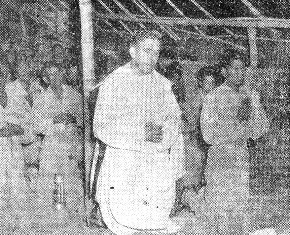 In this unusual worship service conducted by Chaplain Daniel McGuire, scores of Indians kneel and participate in
the ceremony. The service was held at an Indian encampment, at the request of a Mohammedan captain.
In this unusual worship service conducted by Chaplain Daniel McGuire, scores of Indians kneel and participate in
the ceremony. The service was held at an Indian encampment, at the request of a Mohammedan captain.
|
Chaplain Conducts Service
for Indian Christian Soldiers
1347 BU, Shamshernagar, India - A military chaplain isn't supposed to be a missionary, in the strict sense of the word, but Capt. Daniel McGuire, of New York City, base chaplain here, is doing his share to cement American-Indian relations by demonstrating the universality of religion.
Recently, on invitation of a Mohammedan military officer - a captain in command of a detachment of British Pioneer troops - the chaplain journeyed to the Indian encampment to conduct services.
Chaplain McGuire, of the Catholic faith, found the men bivouacked simply, without "luxuries" known to many American bases. The chapel had been built for the occasion, of rattan lashed to bamboo supports, with a black tarpaulin pulled over the bamboo superstructure for a roof. The bamboo altar was bedecked with flowers picked by the Indians.
More than 150 Indian soldiers were on hand for the service. Even the altar boy was a member of the Indian encampment - one who knew the Litany of the mass from memory. he sang his Indian responses to Chaplain McGuire's Latin prayers. At the sound of the Indian's hushed voice, his buddies prayed.
While some of the Indians had been born Christians, the presence of many attested to the work of unsung missionaries.
Keep Airplanes Up Average of 10 Hours a Day
3 Crew Chiefs at 1328 Best 300 Hour Mark in February
Hq., Calcutta - Crew chiefs, with the co-operation of ground crews have stepped up aircraft utilization to the extent of averaging 10 hours' flying time per day for a single plane.
During February four crew chiefs reported having amassed a total of 300 hours' flying time on their respective ships. For March one crew chief has reported accumulating 300 hours on his plane - all Hump trips.
S/Sgts. Arthur C. Monks and Robert H. Miller and Sgt. Delaney J. Braun, 1328, kept their ships aloft a combined total of 918 hours for the 28-day period. T/Sgt. Forrest Oberschlake's ship, at 1333, also passed the 300 hour mark. Last month, M/Sgt. Rex W. Tanberg, 1327, kept his C-87 flying over the Hump 302 hours and 50 minutes. It took several air crews alternating on the same ship, to fly the total hours.
Burma Base Boasts Record Servicing of 65 Craft in 8 Hours
1348 BU, Myitkyina, Burma - With everyone in ICD cupping his hands about refueling records, this Burma station bravely steps out with statistics aimed at lifting a few eyebrows.
A refueling crew, under Sgt. W. H. Lockett, refueled 65 airplanes in eight hours - one plane every eight minutes. The aircraft maintenance department didn't order a trumpet fanfare as this sort of thing is as common as C-rations here.
Total fuel for the period was 34,712 gallons pumped from four F8 and two F2 units.
(Ed. - Six men at 1347 may look down their noses. They pumped 56,101 gallons into 22 ships in the same period.)
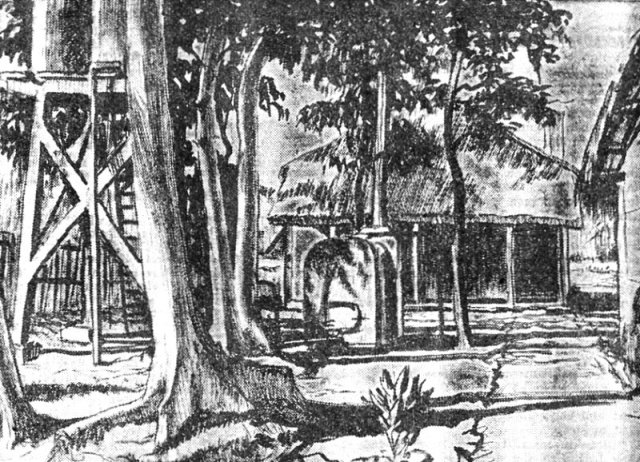
|
Cabin
in the
Woods
Nestled among the trees, like a Stateside cabin in the woods, is this basha of the CO at an Assam base. The officer who had it built was transferred the day it was completed, but he had it nice and cozy for his successor. In the foreground is a boiler made from a tea plantation engine, which heats water for the area. The brush drawing is by Capt. James P. Scott, ICD artist.
15 Radio Ops Log Aggregate of 20,000 Hours
Most of Men are Oldtimers in Division, Wear DFCs, AMs
1326 BU, Lalmanir Hat, India - Among the men who will be able to boast of their part in transporting supplies over the Hump to China are 15 radio operators assigned to this base.
Flying in every kind of weather, these boys have amassed a total of almost 20,000 flying hours which they believe to be a record for this theater.
Most of the men are "old-timers" in this theater and have encountered many a "hair raising" situation while winging their way over one of the world's most hazardous supply routes. To vouch for their many escapades most of the men wear decorations such as the Distinguished Flying Cross and the Air Medal with clusters.
These 15 record makers are: S/Sgt. Husmith Marsh, Satesboro, Ga.; S/Sgt. Raymond W. Smith, Detroit, Mich.; S/Sgt. J. W. Keller, River Forest, Ill.; Sgt. Ervin R. Novitke, Detroit, Mich.; Sgt. Charles A. Hankins, Newport, Ark.; Sgt. Boyd R. Campfield, Stauntin, Va.; Sgt. Morris W. Luper, Garland, Tex.; Cpl. Curtis H. Mattison, Minneapolis, Minn.; Cpl. Norman Selinger, Jamaica, N.Y.; Cpl. Mims M. Grubbs, Motgomery, Ala.; Cpl. Hyman Platinsky, New York City; Cpl. Patrick W. Gaines, Provo, Utah; Cpl. M. E. Howard, Cincinnati, Ohio; Pfc. Clarence E. Ertman, Two Rivers, Wis., and Pvt. John A. Gregory, Maryville, Tenn.
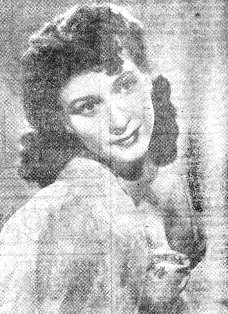 The GIs at 1339 in China have selected Bea Wain as the girl they would most like to spend their 45-day Stateside
furlough with. Well, it's a thought anyway.
The GIs at 1339 in China have selected Bea Wain as the girl they would most like to spend their 45-day Stateside
furlough with. Well, it's a thought anyway.
|
Personnel Explains Various Types of Flying Time
Hq., Calcutta - Types of flying time logged by ICD pilots have been clarified by the personnel section for the purpose of computing hours required for rotation.
In a letter sent Wednesday to all base COs A-1 states: "Henceforth, for the purposes of rotation, all flying hours accumulated in this division will be referred to either as "Hump" time or "trans-India" time, and the following rules will determine which term is applicable:
Hump time will include time logged during the following types of flights:
a. A flight between a base in India and a base in Burma or China (Hump time will be logged from the last base of departure in India).
b. A flight between a base in Burma or China and a base in India. (Hump time will be logged to the first base of arrival in India).
c. A flight between bases in Burma or between bases in China.
d. Food dropping missions, search and rescue missions, and all other missions flown by ICD involving flight over territory where enemy attack is probable and expected.
"Trans-India" time will include all flights by ICD other than those mentioned under "Hump" time as defined above.
(Minimum requirements for rotation and methods of computing flying time for rotation in the four ICD wings were announced in last week's issue of the Express).
In the past, the term "Combat" time has been used. The term actually meant Hump time as defined above. The personnel section has officially announced that there is no such thing as "combat" time for ICD, which will discontinue use of the term.
There are four types of flying, from an operational viewpoint, in which ICD pilots may engage - operational, administrative, training and test flights.
An operational flight is any by which the division's assigned missions are conducted, such as the transport of cargo or passengers, search and rescue activities and special missions.
An administrative flight is one on which division personnel are transported for purely administrative purpose. Training flights and test flights are self-explanatory.
Pfc. Who Wins DFC is Former Infantry Sergeant
1311 BU, Gaya, India - A buck sergeant in the infantry who took a "bust" to private so he could become an aerial radio operator is now a PFC. with a DFC at the radio operator's school here.
In June, 1943, Sgt. Otis C. Finch, who always wanted to fly, got the chance to transfer to the Air Corps as a private and took it.
He was sent to radio school, was graduated, and then went through the usual routine training in the States. Then came ferrying trips, OTU, and finally India where he wound up flying the Hump for ICD. After 100 hours of Hump flying he was hand picked for an instructor's job at the school here.

CHAPLAIN William P. McMullen, after long months of work and waiting, at last had a chapel at 1330 (Jorhat, India) to be proud of and its completion put the chaplain in one of his happiest moods.
The chapel really looked good. Pews and kneelers were installed. New curtains and a brand new color scheme - light cream colored walls and ceiling and wooden beams finished in dark brown - decorated the interior.
The first service was held in this new place of worship and the chapel was jammed beyond capacity. It was an inspiring service.
The following Monday morning Chaplain McCullen spoke to the CO about having a dedication service as soon as the exterior was completed. That same afternoon, when the chaplain made a few calls around the base area, a spark from the kitchen next door caused a fire which broke out on one end of the grass roof and swept across the vast expanse of highly inflammable thatch.
There was a general alarm, but all the efforts of the fire department, the men of the base, volunteer firemen and Indians could not save the roof. Chaplain McMullen's assistant, officers and enlisted men managed to save most of the furniture and equipment with only slight damage. The chapel was a complete wreck.
Chaplain McMullen has not given up, as the motto he has adopted indicates, "We shall rise from the ashes."
Already plans have been submitted for a new chapel to be located in a different area - far away from noise, confusion and the fire hazard.
On Jan. 24, Chaplain Lester E. Burnette (better known as "Chappy") of 1326 BU (Lalmanir Hat, India), organized a Chapel club for the benefit of the personnel of the base.
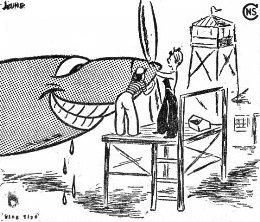
|
The club meets weekly. The object is to encourage post religious activities, to promote fellowship and fun, to plan hunting and fishing trips for recreation. members of the club also visit neighboring missions.
Members of the Chapel club are drawn from all denominations and religious groups. At the last report, membership totaled 70.
Chaplain Burnette says that because of the keen interest of the men, an increase in all religious activities is felt. It also serves to put the men behind the work of the chaplain, he says.
At one meeting the information and education officer led an enlightening discussion on psychology in life. After the discussion period apple pie and ice cream were served.
Cpl. William C. Murphy is president of the club, which has social, news and hospital visitation committees.
Recently two trips to a nearby mission were conducted by the club. On one trip Chaplain Burnette spoke to 150 Christians in English which was translated in Bengali. The songs were in Nepali, the prayer in Boro and the 23rd Psalm was read in Hindi.
Other activities of the club included a tiger hunt, sponsorship of basketball teams and publicity for religious services on the post.
Rotates Back to 1328 from Stay in Shangri-La
1328 BU, Misamari, Assam, India - From 1328 to the States and back to 1328 is the story of Radio Operator Sgt. Richard V. Connorton.
Connorton believes he is the first radio operator to be returned to this theater and his old base where he accumulated his Hump time for rotation.
He was rotated to Uncle Sugar last October and spent approximately 30 days at his home in New Bedford, Mass., before returning to duty. Before coming back overseas Sgt. Connorton was given a three-week refresher course.
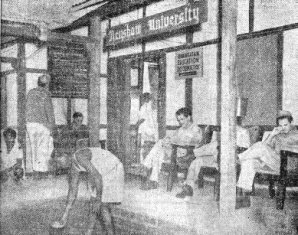 Before the classes begin at 8 p.m. the men brush up on their respective studies in front of the building that
houses 1333's progressive Renshaw University.
Before the classes begin at 8 p.m. the men brush up on their respective studies in front of the building that
houses 1333's progressive Renshaw University.
|
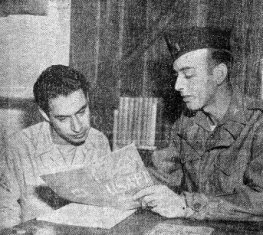 Lt. William A. Domedion, education officer, helps Sgt. Thomas Acosta decide on a new course. Some students
are on their third and fourth courses since last October.
Lt. William A. Domedion, education officer, helps Sgt. Thomas Acosta decide on a new course. Some students
are on their third and fourth courses since last October.
|
Assam College Operated Like Stateside University
1333 BU, Chabua, India - As the division's education program expands, GI institutions of learning are being established at many bases.
At this base the off duty school has been named Renshaw University after a former CO, Col. Harry Renshaw, killed in flight over a year ago.
Renshaw University operates exactly as its American counterparts with its board of trustees, president,
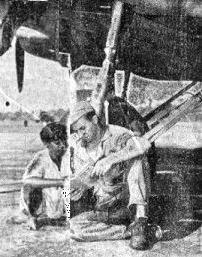 Sgt. Paul Schlueter takes his radio lesson out on the line for the right atmosphere.
Sgt. Paul Schlueter takes his radio lesson out on the line for the right atmosphere.
|
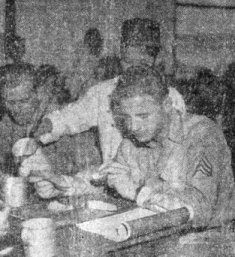 A line mess isn't the quietest place to digest blueprint reading, but this is war.
A line mess isn't the quietest place to digest blueprint reading, but this is war.
|
The board has named 1st Lt. William A. Domedion, education and information officer, as president. He is the only officer actively participating in school politics. GIs, however, elected Lt. Col. Charlie Skannal, the CO, honorary chairman of the board and Brig. Gen. Tunner, Lt. Col. Homer Kellems, division education and information officer, Maj. Caspar O. Dahle, theater education officer, and Maj. E. F. Gerold, I-B branch commandant, USAFI, as honorary members of the board.
A program of intensive classroom study is one of the varied activities of the school. Classes have been successfully completed in advertising, shorthand and English grammar. Underway are classes in business law, music theory, bookkeeping, algebra, review arithmetic, auto mechanics and business English.
The university is divided into separate colleges of business administration, science and mathematics, engineering, liberal arts, professions, and a high school. Each college is under the jurisdiction of a dean. Enlisted men compose both faculty and board. The board of trustees is elected by the students themselves.
Renshaw University is an experiment in letting GIs run their own educational program. The education office stays in the background and Lt. Domedion says the experiment is working out. Already the board is considering cutting his salary as president, appointing a dean of women, and raising funds through a mortgage on the education building.
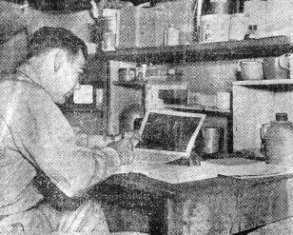 Sgt. Hugh Griffin and his tentmates built this table in their tent for university study and comic perusal.
Sgt. Hugh Griffin and his tentmates built this table in their tent for university study and comic perusal.
|
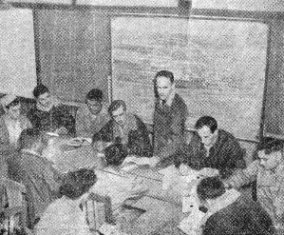 In the study room the men are hard at work preparing for the final exam with the instructor giving a few last minute
tips.
In the study room the men are hard at work preparing for the final exam with the instructor giving a few last minute
tips.
|
'Army Clerk' Manual to be Studied by All Clerks; Then a Test
1328 BU, Misamari, Assam, India - The director of personnel services at this base announced last week that a manual for Army clerks, prepared by T/Sgt. Edward Fritz, would be distributed within the next two weeks to all clerks on the base.
Clerks will be given two weeks to study the content. Then a test will be given on the material covered by the manual and the result of the exam will be made known to the man concerned and his department head.
If the exam is not passed it will be possible for the man to prepare for another test by taking courses at special night classes.
Clerks immediately affected will be those classified as 502s and 405s and any 055 who at present is doing clerk-typist work or handling correspondence. Later there will be a similar program designed specifically for 055s.
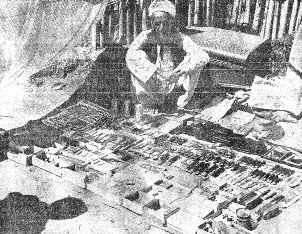 Here is a typical Indian scene in which a streetside vendor rivals Macy's variety with 97 different articles on display
and more in the trunk for the hard-to-satisfy type of customer.
Here is a typical Indian scene in which a streetside vendor rivals Macy's variety with 97 different articles on display
and more in the trunk for the hard-to-satisfy type of customer.
|
Trouble Galore Besets Bamboo 'U' at 1326 BU
115 Students Register for Six Classes; GIs Are Instructors
1326 BU, Lalmanir Hat, India - An educational epic with a GI setting is being written here as the 1326 Bamboo university unreels its first semester of USAFI learning.
Beset by the difficulties of continuous transfers of instructors and students, with a dash of "mortgage" trouble tossed in, ol' Bamboo U started business for the education of 115 students registered in six classes.
The "mortgage" impasse arose when the classroom basha was requisitioned for other purposes. Lock, stock, and blackboard, the off-duty educational project moved to a new site.
Lt. William H. Dawson, information and education officer, has plugged his product with the zeal of a Fuller brush salesman. A graduate of College of the Pacific, California, Lt. Dawson was a psychiatric social worker in Stockton, Calif.
Six enlisted instructors - all college men and several former school teachers - aid in the operation of classes. They are Sgt. Thaddeus Penar, Grove City, Pa.; Sgt. James Nash. St. Joseph, Mo.; Sgt. Harold Schroer, McKittrick, Mo.; Cpl. Charles Gelber, Englishtown, N.J.; Cpl. Scott Whetzel, Fairfax, Va., and Pfc. Claude Loudenslager, Egan, S.D.
'Boys in Blue,' Those in Khaki, Best of Chums
Try to Outdo Each Other in Series of Fetes
1330 BU, Jorhat, Assam, India - Co-operation between land and sea forces never has reached a higher level than it has here recently, though in other places more vital issues may have been at stake.
The inland sailors who compose the Navy's unit supplying oxygen to Hump fliers near here have co-operated in the past in such matters as providing ice cream for the ICD hospital, while the ATC boys have returned the courtesy by lending the beached bellbottoms every assistance in establishing their jungle installation.
During the past couple of weeks, however, it was decided by some of the enlisted men in the respective sections that rapprochement of an unofficial nature might be even more gracious and satisfying - maybe more fun, too.
The Army led off with a beer party for the Navy. Next week the Navy counters with chapter two of the home-and-home series, and promises or threatens to outdo the Army's brawl while playing hosts.
Comparative capacities are a strictly guarded military secret.
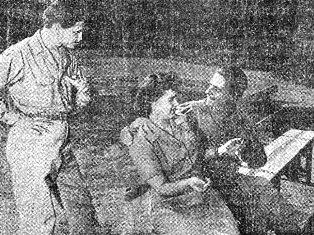 The situation is more confusin' than amusin' for WAC Cpl. Ruth Kullberg, as she tries to figure out which guy has
the date with her. At the left Bill (or is it Stan?) Fleischman tries to convince her he has, but Stan (or it
might be Bill) already seems to be making a little headway in the matter.
The situation is more confusin' than amusin' for WAC Cpl. Ruth Kullberg, as she tries to figure out which guy has
the date with her. At the left Bill (or is it Stan?) Fleischman tries to convince her he has, but Stan (or it
might be Bill) already seems to be making a little headway in the matter.
|
WAC Has Troubles
Dating Fleischmans,
ICD Identical Twins
Hq., Calcutta - WAC Cpl. Ruth Kullberg, Long Island, N.Y., has her troubles when she dates Cpl. Bill Fleischman, Brooklyn, because she never knows who's going to show up - Bill, or his twin brother, Stan, also a corporal.
The first time Ruth went out with one of the Fleischman twins she had no idea the other existed.
On one recent occasion, Bill arrived at trifle late, to discover Stan already ensconced on Ruth's doorstep. In such a case, attempts to convince the WAC who is who, and who asked first, leads only to greater confusion. Neither of the twins hesitates to switch identities when it will strengthen his case or weaken his brother's.
The Fleischman twins, known from coast to coast in the States as the "Franklin Twins," comedy vaudeville act, are entertainers on ICD's traveling Entertainment Unit No. 3. They are starting their third extensive tour of the division. Cpl. Kullberg, their confused lady friend, is assigned to the AAF inspector general's section at Hq., Eastern Air Command.
Two Parties Fail To Locate Plane, So the CO Goes
1328 BU, Misamari, India - Following two unsuccessful attempts by pretentious search parties to locate a wrecked plane in the mountains, Col. C. U. Pratt, CO, and Maj. William Volz accomplished in 20 hours what the first two parties had failed to do in four and five days.
The first party comprised a captain, three lieutenants, a GI, seven Gurkha soldiers and 15 Duffla porters. They stayed out four days and didn't get near the wreck.
The second party, a bit more streamlined, included two captains, two lieutenants and two Duffla bearers. They came within 75 yards of the wreck, scoured the mountainside for more than three days and then turned back, unsuccessful in their search.
It was at this juncture that the CO asserted he and Maj. Volz could get to the wreck, investigate it and return within 36 hours. Armed with aerial photos and unhampered by a large party, the two set out at 3 a.m. and returned at 11 p.m. - mission accomplished.
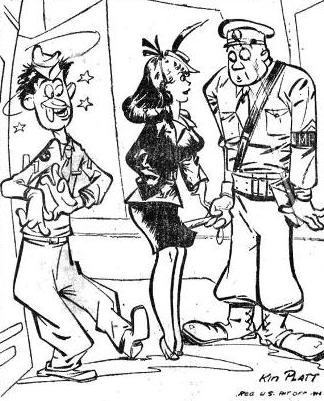 "Will you tell this soldier to stop following me . . . I have a date tonight."
"Will you tell this soldier to stop following me . . . I have a date tonight."
|
Sgt. Has Own Ideas About This Atabrine Stuff
1327 BU, Tezpur, Assam, India - In the base hospital languishes a GI with some mixed emotions on atabrine.
T/Sgt. Louis W. Medecke readily acknowledges the benefits of atabrine in a malarial area but the stuff is partially responsible for a hold-up on his rotation.
A few evenings ago Medecke felt ill after taking the daily ration and made a mad dash from the mess hall. Somehow he overlooked a step outside the door, sailed into space and landed resoundingly on his shoulder. The fall tore loose muscles and tendons and he was rushed to the sick bay.
Just prior to eating, Medecke had got his rotation orders and was jubilantly packing for return Stateside. Now, bedded down in the hospital, he will have to sweat out recovery, because medics have forbidden travel.
ICD Awards Total of 2,302 Medals in March,
High Month
Hq., Calcutta - Last month ICD handed out 2,302 awards, more than any month in the history of the division.
Of the total, 896 were Air Medals, 455 Oak Leaf clusters to the Air Medal, 761 Distinguished Flying Crosses, 183 Oak Leaf clusters to the DFC, five Bronze Star Medals and two Purple Hearts.
Four of the Air Medals went to 20th Bomber Command enlisted men, upon recommendation of ICD, and four Bronze Star Medals were awarded to ASC personnel.
HUMP EXPRESS is the official newspaper of the India-China Division, Air Transport Command, APO 192, c/o Postmaster, New York, N.Y., and is published by its Public Relations office. Camp Newspaper Service and Army Newspaper Service features are used, reproduction of which is prohibited without permission of CNS and ANS, 205 East 42nd St., New York, 17, N.Y. Other material is submitted by staff members, ICD-ATC base Public Relations sections and other soldier correspondents. Printed weekly by the Hindusthan Standard, 3 Burman St., Calcutta, India, and distributed each Thursday. Passed by U.S. Press Censor for mailing.
| Military transport schedules over India for cargo, personnel and mail . . . maximum tonnage of essential war materials over the Hump . . . movement of troops and supplies in support of tactical operations in China . . . evacuation of the sick and wounded - these are the missions of ICD-ATC. |

APRIL 5, 1945
Original issue of HUMP EXPRESS shared by CBI veteran Steven C. King, author of Flying the Hump to China.
Note: The dateline in each story has had the specific location name added.
Copyright © 2006 Carl Warren Weidenburner
TOP OF PAGE PRINT THIS PAGE ABOUT THIS PAGE E-MAIL YOUR COMMENTS
PREVIOUS ISSUE HUMP EXPRESS BASE NEXT ISSUE
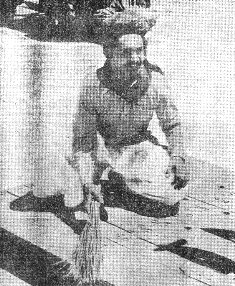 Applying for a job at the civilian personnel office, this Indian sweeper was employed until it was learned he had
another job at this same base. Civilian personnel's interpreter had a hard time getting information out of the
new employee, called Mustakas, because he spoke a dialect not used in this part of India.
Applying for a job at the civilian personnel office, this Indian sweeper was employed until it was learned he had
another job at this same base. Civilian personnel's interpreter had a hard time getting information out of the
new employee, called Mustakas, because he spoke a dialect not used in this part of India.